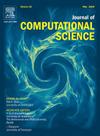A new fourth-order compact finite difference method for solving Lane-Emden-Fowler type singular boundary value problems
IF 3.1
3区 计算机科学
Q2 COMPUTER SCIENCE, INTERDISCIPLINARY APPLICATIONS
引用次数: 0
Abstract
We develop a novel fourth-order compact finite difference scheme to solve nonlinear singular ordinary differential equations. Such problems occur in many fields of science and engineering, such as studying the equilibrium of an isothermal gas sphere, reaction–diffusion in a spherical permeable catalyst, etc. These problems are challenging to solve because of their singularity or nonlinearity. By our proposed method, we can easily solve these complex problems without removing or modifying the singularity. To construct the new fourth-order compact difference method, Initially, we created a uniform mesh within the solution domain and developed a compact finite difference scheme. This scheme approximates the derivatives at the boundary nodal points to handle the problem’s singularity effectively. Employing a matrix analysis approach, we discussed the convergence analysis of the methods. To demonstrate its efficacy, we apply our approach to solve various real-life problems from the literature. The new method offers high-order accuracy with minimal grid points and provides better numerical results than the nonstandard finite difference method and exponential compact finite difference method.
解决 Lane-Emden-Fowler 型奇异边界值问题的新四阶紧凑有限差分法
我们开发了一种新颖的四阶紧凑有限差分方案来求解非线性奇异常微分方程。这类问题出现在科学和工程的许多领域,如研究等温气体球体的平衡、球形渗透催化剂中的反应扩散等。由于这些问题的奇异性或非线性,其求解具有挑战性。通过我们提出的方法,我们可以在不消除或修改奇异性的情况下轻松解决这些复杂问题。为了构建新的四阶紧凑差分法,我们首先在求解域内创建了一个均匀网格,并开发了一种紧凑有限差分方案。该方案对边界结点的导数进行了近似处理,从而有效地处理了问题的奇异性。我们采用矩阵分析方法,讨论了方法的收敛性分析。为了证明其有效性,我们应用我们的方法解决了文献中的各种实际问题。与非标准有限差分法和指数紧凑有限差分法相比,新方法以最小的网格点实现了高阶精度,并提供了更好的数值结果。
本文章由计算机程序翻译,如有差异,请以英文原文为准。
求助全文
约1分钟内获得全文
求助全文
来源期刊

Journal of Computational Science
COMPUTER SCIENCE, INTERDISCIPLINARY APPLICATIONS-COMPUTER SCIENCE, THEORY & METHODS
CiteScore
5.50
自引率
3.00%
发文量
227
审稿时长
41 days
期刊介绍:
Computational Science is a rapidly growing multi- and interdisciplinary field that uses advanced computing and data analysis to understand and solve complex problems. It has reached a level of predictive capability that now firmly complements the traditional pillars of experimentation and theory.
The recent advances in experimental techniques such as detectors, on-line sensor networks and high-resolution imaging techniques, have opened up new windows into physical and biological processes at many levels of detail. The resulting data explosion allows for detailed data driven modeling and simulation.
This new discipline in science combines computational thinking, modern computational methods, devices and collateral technologies to address problems far beyond the scope of traditional numerical methods.
Computational science typically unifies three distinct elements:
• Modeling, Algorithms and Simulations (e.g. numerical and non-numerical, discrete and continuous);
• Software developed to solve science (e.g., biological, physical, and social), engineering, medicine, and humanities problems;
• Computer and information science that develops and optimizes the advanced system hardware, software, networking, and data management components (e.g. problem solving environments).
 求助内容:
求助内容: 应助结果提醒方式:
应助结果提醒方式:


